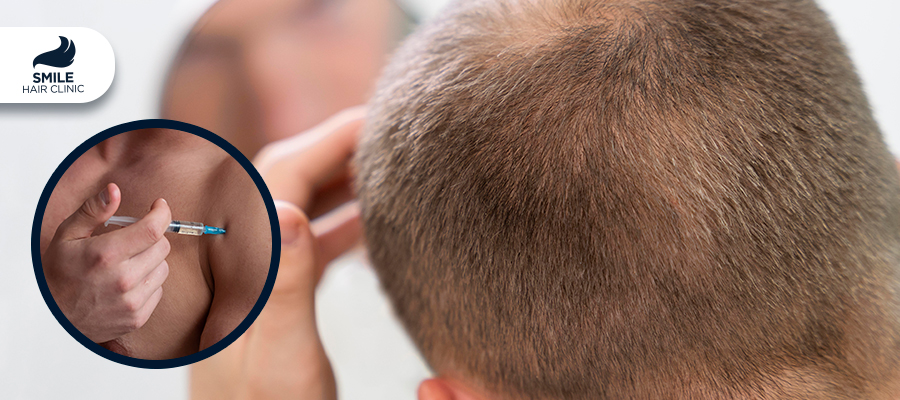Testosterone Injections and Hair loss

Publish Date: 9 December 2024
Worst Nightmare of A BodyBuilder
As some background information, testosterone is an important hormone responsible for many functions in the human body, such as muscle growth, bone density, energy levels, and mood. Testosterone injections, which often appear to bodybuilders, make attractive fame of muscle mass and performance. But with this comes a spectrum of possible side effects, especially regarding hair health.
Testosterone and Its Role in Bodybuilding
Testosterone is an anabolic hormone that stimulates protein synthesis and muscle growth. Athletes and bodybuilders especially will see an improvement in strength, recovery and lean muscle gain from optimal testosterone levels. Yet, for some people, age, genetics, or other factors can lead to less-than-ideal testosterone levels. This has led many to turn to testosterone replacement therapy (TRT) or anabolic steroids.
Testosterone is commonly injected intramuscularly to raise hormone levels in the bloodstream, and if necessary, people may achieve rapid and visible gains in muscle mass. However, synthetic testosterone can have a chain of physiological effects, not all of which are good for hair.
Testosterone and Hair Loss
TESTOSTERONE DHT LINK: The relationship between testosterone and hair health is primarily through its conversion to a potent androgen called dihydrotestosterone (DHT). DHT attaches to specific receptors present in hair follicles, most notably those located in the scalp, ultimately causing miniaturization of the follicle and hair loss for individuals with a genetic sensitivity. This phenomenon is referred to as androgenetic alopecia or male-pattern baldness.
How Testosterone Injections Affect Your Hair Loss?
Elevated DHT Levels: Injected testosterone contributes to higher levels available for conversion via the enzyme 5-alpha-reductase. Elevated DHT causes hair follicles in sensitive scalp regions to miniaturize (get smaller) faster.
Genetic Disposition: Not Everyone is Affected in the Same Way by DHT. Androgenetic alopecia has a strong genetic component. But in genetically susceptible people, testosterone injections can worsen hair loss.
Hormonal Disruption: Adding external testosterone can interfere with the body’s natural hormone production, causing an imbalance that can then impact hair growth phases.
Alopecia: Follicles shrink over time due to DHT, resulting in thinner hair and less growth.
Changed Hair Growth Phases: Those on testosterone may find their anagen (growth) phase shortened with testosterone injections, resulting in less time for hairs to grow and more shredded.
Reversal Possible in Some Cases: If thinning hair or shedding is recognized early and testosterone levels are controlled, several people may see a reversal of hair loss.
How to Prevent Hair Loss After Testosterone Injections
Although testosterone-related hair loss can be distressing, several measures can help to minimize this impact:
Monitor DHT Levels
For example, regular blood tests to check testosterone and DHT levels will allow you to monitor the effect of your injections on your hormonal profile. Decreasing the risk of hair loss via dosage or injection frequency adjustment
Use DHT Blockers
Drugs such as finasteride and dutasteride inhibit the 5-alpha-reductase enzyme, thereby lowering DHT concentration. They are commonly used to treat androgenetic alopecia. However, talk with a healthcare professional before starting them, as they can have side effects.
Incorporate Topical Solutions
Minoxidil, a topical agent, increases blood flow to hair follicles and can slow or even reverse hair loss. When combined with testosterone therapy, it may help protect against hair loss.
Optimize Lifestyle Factors
Following a healthy routine can help to address and prevent hair loss:
Nutrition: A diet rich in biotin, zinc, iron, and omega-3 fatty acids can keep your hair growing.
Stress Management: Chronic stress causes the body to produce cortisol, which can lead to hair loss. Include stress-reduction techniques like meditation or yoga.
Avoid damaging hair: Avoid heat styling tools and chemical treatments if possible.
Low-level laser therapy (LLLT)
Devices like laser combs or caps are LLLT devices that boost hair follicles and increase hair density. These are supplements for hair loss treatment.
Design Your Own Alleged Testosterone Regime
Customize your testosterone therapy with a healthcare provider. Lower dosages or alternative administration methods (e.g. with gels or patches) might mitigate the risk of elevated DHT.
PRP (Platelet-rich plasma) therapy
PRP therapy involves taking platelets from a blood sample and injecting them into the scalp to stimulate hair growth. This reversal can help mitigate the hair thinning caused by testosterone injections.
Long-Term Health Problems of Testosterone Injections
In addition to managing hair loss, those exploring testosterone injections should also keep the following potential long-term side effects in mind:
Cardiovascular Risks: Testosterone therapy can impact cholesterol levels and blood pressure, which may increase the risk of heart disease.
Natural Testosterone Suppression: Ttherapy may block the manufacture of the body’s own testosterone due to its dependency upon it.
Mood Swings: High testosterone could result in some emotional fluctuations, aggression, or even anxiety.
Skin and Acne Problems: The increase in oil production linked to testosterone can trigger acne or other skin problems.
Weighing the risks versus the potential rewards of testosterone injections is crucial, especially when used for nonmedical reasons like bodybuilding.
How to Boost Testosterone Naturally
If you’re reluctant to consider injections, natural options for raising testosterone levels may be worth investigating:
Strength training: Resistance training and hefty lifting can increase natural testosterone production.
Enough Sleep: Sleep is vital for hormone production.
A Balanced Diet: Emphasis on healthy fats, lean proteins, and whole grains to promote hormonal balance.
Supplements: Some supplements, such as vitamin D, magnesium, and zinc, may naturally boost testosterone levels.
However, they are fraught with possible side effects, especially concerning hair health; people do not give up testosterone injections to be in better shape.
Knowledge is power when it comes to testosterone, DHT, and hair loss. If you’re one of the unlucky few with a genetic disposition to hair loss, hormone levels, DHT blockers, and healthy lifestyle choices can help minimize the effects of testosterone injections on your hair. Working with a healthcare professional is essential in developing a personalized plan that balances muscle growth and lasting health.
Last Update: 9 January 2025
 Whatsapp
Whatsapp